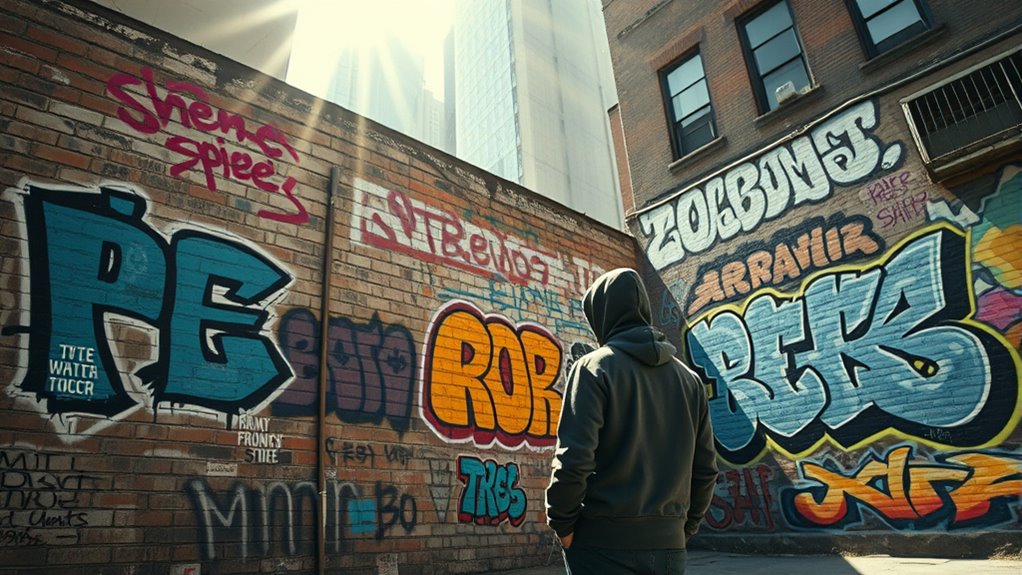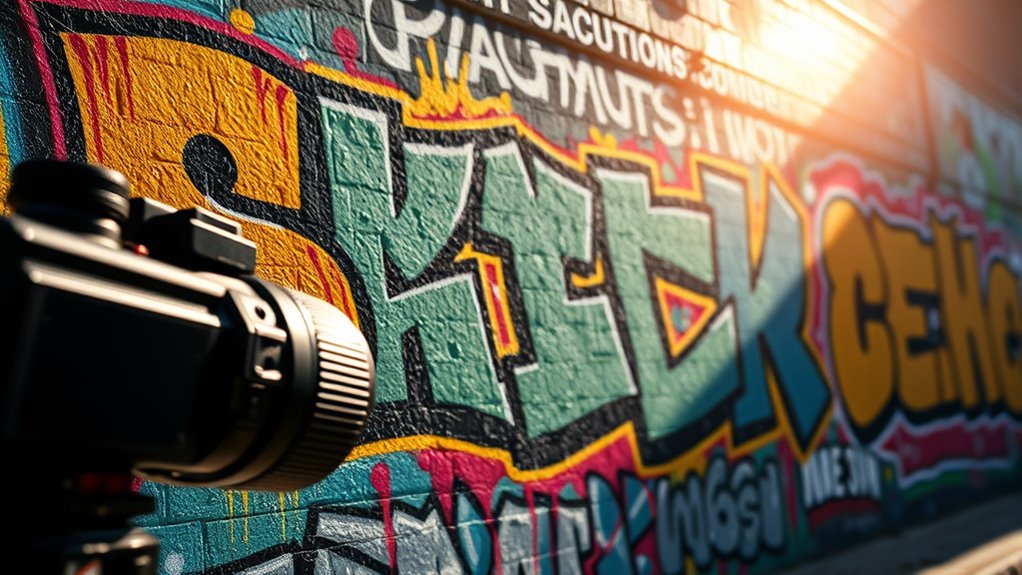Hip-hop lyrics have become powerful cultural quotes that go beyond music, reflecting society and inspiring movements. Lines like Tupac’s “Keep your head up” or Jay-Z’s “I’m a business, man” capture social struggles, hope, and identity. Artists craft these words with clever wordplay, metaphors, and rhythm, making them memorable and meaningful. If you keep exploring, you’ll discover how these iconic quotes shape history and continue to influence generations.
Key Takeaways
- Iconic hip-hop lyrics often transcend music to become cultural quotes inspiring social movements.
- Clever wordplay and metaphors make lyrics memorable and impactful beyond their songs.
- Quotes like Tupac’s “Keep your head up” promote resilience and social awareness.
- Lyrics reflect societal struggles, hopes, and identities, shaping cultural narratives.
- Enduring quotes elevate hip-hop as a poetic storytelling force influencing fashion, language, and attitudes.

Hip-hop has long been a powerful platform for storytelling and self-expression, and some lyrics have transcended music to become iconic quotes. These words do more than fill songs; they capture cultural moments, inspire movements, and reflect personal truths. When you listen closely, you’ll notice that behind every memorable line is a display of lyrical craftsmanship—artists carefully craft their words to resonate deeply. It’s this skill that elevates lyrics from simple rhymes to powerful statements that stand the test of time. Through clever wordplay, metaphors, and rhythm, hip-hop artists create lines that are not just catchy but meaningful, embedding themselves into the collective consciousness.
Their lyrics often serve as reflections of societal struggles, hopes, and victories, making them more than just entertainment—they become cultural touchstones. For example, when you hear a line like “I’m not a businessman, I’m a business, man” (Jay-Z), you’re witnessing a clever play on words that highlights entrepreneurial spirit and confidence, but also captures a broader cultural shift. These quotes aren’t just memorable because of their cleverness; they’re powerful because they represent real experiences and aspirations. Hip-hop’s influence on culture is profound because it’s rooted in authenticity and raw truth, and these quotes become rallying cries, inspiring generations to think differently and challenge the status quo.
You can see how these lyrics, through their lyrical craftsmanship, contribute to shaping cultural narratives. When an artist like Tupac proclaims, “Keep your head up,” it’s more than just a phrase—it’s a message of resilience that resonates across communities facing adversity. These lines often encapsulate complex social issues in simple, impactful words, making them accessible and memorable. Additionally, the use of metaphors and vivid imagery helps deepen their emotional impact and ensures they resonate on multiple levels. As a result, they become part of everyday conversations, social movements, and even political discourse. Their cultural influence extends beyond the music industry, influencing fashion, language, and attitudes.
In essence, these lyrics become timeless quotes because they do more than just rhyme—they embody a spirit of resistance, hope, and identity. The artistry behind them, rooted in lyrical craftsmanship, ensures they carry weight and meaning, inspiring countless others. When you recognize a quote from a song, you’re witnessing a piece of history, a reflection of cultural identity, and an example of how superb lyrical work can elevate a phrase into an enduring symbol. Hip-hop’s ability to craft these impactful quotes is a tribute to its power as a cultural force and a form of poetic storytelling.
Frequently Asked Questions
How Do Lyrics Influence Mainstream Culture Beyond Music?
You see, lyrics influence mainstream culture by shaping ideas and conversations beyond music. When artists promote lyrical authenticity, they inspire trust and connection, but cultural appropriation can distort these messages and create controversy. Your engagement with lyrics impacts societal norms, language, and even fashion. As lyrics become quotes or slogans, they reinforce or challenge cultural values, making music a powerful tool for cultural expression and change beyond just entertainment.
Which Hip-Hop Artists Are Known for Their Lyrical Depth?
You’re drawn to artists whose lyrical complexity and storytelling mastery elevate hip-hop beyond mere beats. Artists like Kendrick Lamar, Nas, and Lauryn Hill are renowned for their profound lyricism, weaving intricate narratives and deep messages that resonate emotionally. Their work reflects a poetic depth that transforms everyday experiences into powerful cultural statements, proving that true artistry isn’t just about rhythm but about crafting timeless, meaningful stories that inspire and provoke thought.
How Have Hip-Hop Quotes Impacted Social Movements?
You see, hip-hop quotes have played a powerful role in social movements by inspiring street activism and spreading political slogans. When artists share impactful lyrics, they motivate communities to stand up, voice their struggles, and demand change. These quotes become rallying cries, uniting people and amplifying their message, proving that hip-hop isn’t just music—it’s a tool for social and political transformation.
What Is the Process of Turning Lyrics Into Iconic Quotes?
You analyze the lyrical craftsmanship behind hip-hop lyrics to identify quotable moments that resonate deeply. When lyrics capture universal truths or emotional truths, they become memorable. You then share these quotable moments widely, often through media or performances, which help cement them into cultural consciousness. Over time, these lyrics evolve into iconic quotes, inspiring others and solidifying their place in history, transforming everyday language into powerful expressions.
Are There Any Controversies Surrounding Famous Hip-Hop Quotes?
You might wonder if famous hip-hop quotes spark controversies. Some argue that street art and lyrical authenticity are sometimes challenged or misunderstood, leading to debates about whether lyrics promote violence or reflect real-life struggles. These quotes often become symbols of culture, but their interpretation can vary. As a result, certain lyrics ignite discussions about freedom of expression, artistic integrity, and the impact of hip-hop on society.
Conclusion
So, next time you hear a rapper’s words, remember they’re more than just lyrics—they’re subtle whispers that shape culture and inspire minds. With a little patience, you might find yourself catching a deeper meaning, like discovering a hidden gem. These lines, once considered mere words, gently guide us through life’s complexities. In their quiet way, they leave an everlasting imprint, reminding us that sometimes, the simplest phrases hold the greatest wisdom.









